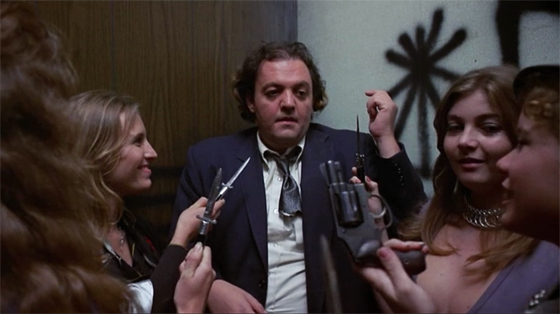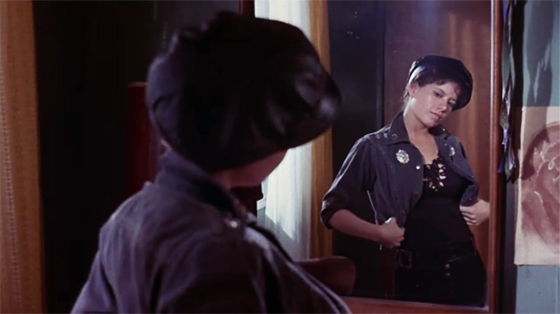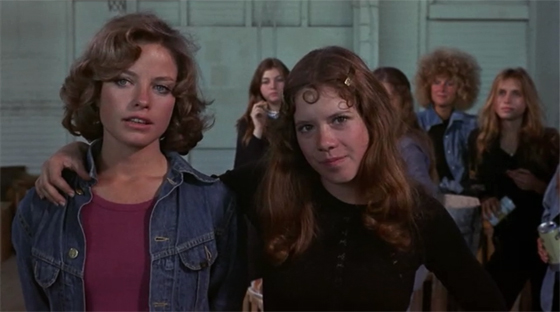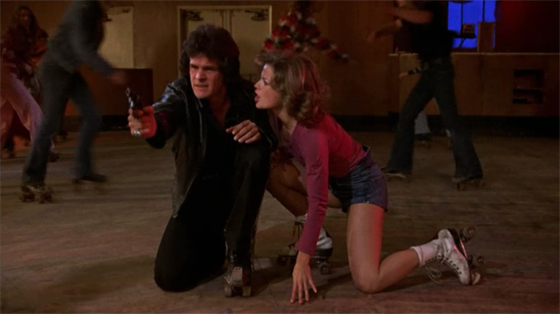
It’s nice to know that movies like Switchblade Sisters (1975) exist. Because the 1970’s weren’t like this – they ought to have been – although I suspect that director Jack Hill was simply expressing what he felt all drive-in films should be. The result is a film which Quentin Tarantino famously championed, and it’s easy to see Hill’s mark on Tarantino’s style – tough, playful, over-the-top. Hill was of the new generation of film brats who would leave a significant mark on cinema in the 1970’s (Francis Ford Coppola was a classmate of his at UCLA film school); but he never graduated to the Hollywood elite, and made exploitation films until the early 80’s. Notably his filmography includes the Pam Grier vehicles Coffy (1973) and Foxy Brown (1974); I’m a big fan of Spider Baby (1968), a delirious, dark-humored horror film which prefigures The Texas Chainsaw Massacre (1974). Emerging from the Roger Corman school of filmmaking, Hill knew how to take familiar genre clichés and ratchet them up a few notches. His women are loud and brassy, Russ Meyer-style, and frequently violent. Switchblade Sisters (original title: The Jezebels) essentially takes the premise of a 50’s juvenile delinquent picture and launches it forward into the borderline-surreal. I took it as a parody of the genre. Hill, in an interview with Cashiers du Cinemart, says it was intended to be a “futuristic fantasy, Clockwork Orange type of movie,” which, in retrospect, makes sense. It certainly doesn’t take place in the real world, to its eternal credit.

Lace (Robbie Lee) enjoys a moment of vanity and gang pride in the opening credits of "Switchblade Sisters."
The film opens beautifully. In a grimy, Cabrini-Green-style apartment complex, a landlord shakes down a single mother for rent. While her daughter, Lace (Robbie Lee), eavesdrops from the next room, she pleads to the landlord to hold off – she needs the money to feed her children. After caving in and handing over the cash, she says, “And I hope you roast in Hell.” The fat landlord smugly steps into an elevator, but Lace joins him. She licks her lips teasingly. Then more girls cram into the elevator, all, like Lace, dressed in black and looking like bad news; one girl even has an eyepatch. They corner him. When he demands they get out of his way, all draw switchblades. Lace reaches into his coat and pulls out a revolver. “What’s the world coming to, girls?” she says, then: “Get him!” The entire gang of females jump him. One comic book-style wipe later, and they’re strutting confidently down the middle of the street, past a newspaper stand with headlines like “Twelfth Week of Garbage Strike” and “Crackdown on Youth.” When a car honks for them to get out of the street, they draw their blades. But soon that landlord shows up again – his clothes ripped to shreds – and directs the police to arrest the whole gang, known as the Dagger Debs. No matter; they get tossed in prison all the time. They even have enough dirt on the butch-lesbian warden to escape her rape-y advances. They know they’ll be out in no time.

Maggie (Joanne Nail) is introduced to the Silver Daggers by Lace.
But there’s a new element in their routine: Maggie (Joanne Nail), a pretty young woman who proves that she’s tougher than she looks. Quickly earning the gang’s respect, they defend her from the warden, and when she’s released early, she obliges Lace by delivering a love poem to Lace’s boyfriend, Dominic (Asher Brauner) of the Silver Daggers gang. Dominic becomes infatuated with Maggie – so much so that he follows her home and sexually assaults her while her mother’s in the next room. Maggie hasn’t the heart to tell Lace, and when the Debs are out of prison, they’re soon taking Maggie in as one of their own, rechristening themselves the Jezebels, and plotting to team with the Silver Daggers to wrest control of the school from a rival gang led by a prettyboy named Crabs (Chase Newhart). While the gang war escalates, Lace learns of her boyfriend’s infidelity, and sets up Maggie to take a fall. A bloody shootout with Crabs’ gang at a roller rink leads to Dominic’s death, but Lace won’t be satisfied until she can get Maggie to take a bullet.

Chaos at the roller rink: Dominic (Asher Brauner) answers bullets with bullets while Maggie looks on.
All of this is delivered straight-faced. There’s even a scene ripped straight from an Afterschool Special when Lace tells Dominic she’s pregnant, and he, with irritation, asks her to “take care of it.” (That is, it would be from an Afterschool Special, if it weren’t for the fact that Lace is topless throughout the scene.) The melodrama between Lace and Maggie is played to the hilt. It’s the landscape these characters occupy that serves for satire: the faculty is in constant terror of the gangs, and sheepishly requests protection from them; in one scene, Lace steps up and threatens a student who keeps interrupting the teacher. Crabs, who’s been bought off by the teachers to protect the school, hangs posters of his countenance, Big Brother-style, in the hallways and on the streets (“Power Through Progress,” the poster proclaims). His prized amulet, which Maggie is tasked to steal as an initiation rite, is a ridiculous-looking piece of plastic that looks like it came out of a cereal box. But all of it is brought to the level of punchy pop art thanks to Robbie Lee’s campy, sneering performance as Lace, and Jack Hill’s fully-engaged presentation. His aim is pure: make the audience go wild. And that should have happened, except that mismarketing allowed the film to slip between the cracks. No one was quite sure what Switchblade Sisters was, so nobody went. It’s in retrospect that we can appreciate the gritty feminism, the crazed shootouts, the histrionic dialogue, and the cockeyed vision of an American original – drive-in cinema at its best.









